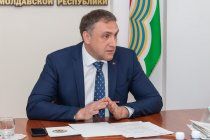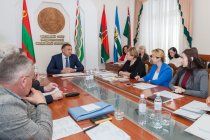 Русский
Русский English
English-







The Work Plans for May
The working week after the May Day holidays in the Supreme Council began with a meeting of the Presidium. The members worked on drafting the agenda of the plenary sessions of the Parliament, scheduled for 17 and 31 May.
Within 30 working days the people's deputies have to take a decision on the package of legislative initiatives sent to the Supreme Council in the regime of legislative necessity by the President of the Republic Vadim Krasnoselsky. We are talking about amendments in some of the norms of the constitutional law "On the Prosecutor's Office", the laws "On the Investigative Committee" and "On Operative-Search Activity", as well as the Code of Criminal Procedure.
At the same time, parliamentarians in May will have to express their opinion and decide on two alternative legislations on the collection, distribution and expenditure of local taxes. The first one was proposed by the deputies of the Grigoriopol town and district council, the second by members of the profile parliamentary committee for state regional politics Oleg Vasilaty, Valentin Matveychuk and Yakov Galak. People's deputies of Grigoriopolis consider that local councils, along with the ability to determine the rates of local taxes and the timing of their collection in the local budget, should be given the right to establish a list of categories of taxpayers subject to full or partial exemption from paying local taxes and fees. This, in particular, concerns the target fee for the improvement of the village (settlement). Deputies of the highest representative body of authority are approaching the solution of the issues of functioning of local authorities of democracy in a complex manner and they are in favor of building a system of local taxes and fees in accordance with the structure of local self-government - two levels.
The Supreme Council's Committee on Public Associations, Sports, Information and Youth Policy intends to bring to present to deputy corps a package of legislations initiated by Igor Buga and Andrei Safonov, designed to regulate the right of convicts to freedom of religion. They are aimed at strict observance of the constitutional guarantees of citizens for the realization of the right to freedom of conscience and religion. It can be realized at the expense of the legislative norm, which secures the right to conduct religious rites in institutions that carry out criminal penalties in the form of deprivation of liberty. At the same time such a right should not contradict the requirements of the penal enforcement legislation.




